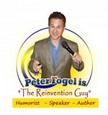The speakers people like the most, or who have the greatest impact, are said to have “presence.” Something special that leaps out at you. Certain actors have it, and that makes them "stars." Certain models (who by the way are sometime average looking people in real life) somehow "click" with the camera and it just loves them.
Well, guess what? It's the same with speakers who have that "X" factor. It's those special speakers who bound onto the platform and you can't take your eyes off of them. What makes these speakers so special? Simply put, it these speakers who are fluent in the unspoken language of emotion and spirit.
And here's the part you might find hard to fathom. YOU, with the right mind set and training, can also learn to speak this language as well!
That's because experience shows great speakers know there is a need to learn three languages besides the spoken word. There is vocal language, physical language, and emotional language.
Remarkably, if you only use the spoken word, you miss out on a lot of what you can do to connect with an audience.
You see, vocal language is the way your verbal language sounds, including pauses, rhythm, and volume.
Physical language includes movement, body language, and eye contact. Emotional language is the underlying energy you bring to a speech; your audience can only feel this language if you feel it as you speak. Your personal way of expressing yourself in everyday life mixes these four languages.
Silence, for instance, is when emotional and physical language can speak. You can really make much of spaces between words as you fill them with emotions and thoughts through the emotional and physical languages.
Just like good writers show emotions rather than telling about them, good speakers use physical, vocal, and emotional languages to illustrate stories and points.
Make no mistake: whether you are an experienced or emerging speaker, you can create a multi-layered emotional response by showing your audience how you react naturally.
For instance, when something absolutely fantastic happens to you, what do you do physically? What noises do you make?
Guess what? This is a side of you, you SHOULD show your audience. Act it out as you feel the emotions in your story. Then, let those emotions sink in for the audience with a moment of reflection, as you would let them sink in for yourself.
From the first person in your row, to the last person in the auditorium … the silent moment where you’re really feeling the weight of your joyful emotions is the emotional language t your audience will feel as well.
To Make an Impact Your Goal Is to Play into the Emotional Language with The Stories You Present In Your Speeches
?Pick up your favorite, most emotional story, and find places to add in vocal, emotional, and physical languages.
?Rehearse how the moment felt and what you did with those feelings.
?Sit in the silence and savor the emotions of the moment, and your audience will savor them, too.
Time and time again it's been show that speakers who use emotional, physical, vocal, and verbal languages connect with audiences and are seen as authentic people.
They create lasting impressions that people remember, even if they hear similar speeches later on.
Remember: These four vital languages combined with the ability to integrate left and right brain functions is how we naturally speak. Whether you think so or not, your audience will feel that you’re actually speaking to them rather than speaking at them.
Yes, it takes lots of practice to move from talking at your audience to sharing emotions and connections with them. Not every speaker is comfortable with this layered way o public speaking. But with practice you can absolutely reach this highest and best form of speaking.
As an alternative to narrative storytelling, this particular type of acting out of a story can really set you a apart from your speaking competition. In the acting world from where I original trained in -- we cal this method acting.
We were trained to feel the emotions…see the sights… smell the smells. We are what they call "in the moment" And you can take the same approach with your speaking.
And here's something I can't make any clearer for you -- and is something some speakers forget.
When you're on stage speaking -- you're the writer, the composer, the actor, of your whole presentation. You have complete control of your speech, and isn't that empowering?
With practice and diligence and coaching, you, too, can learn this deeper method of speaking! The stage is yours, my friend. The audience is there to see YOU and hear your words of wisdom… to have their lives transformed!
Remember: For a deeper connection and bond with your audience you should and talk as you practice your stories. Then practice the emotional, physical, and verbal content of your stories, too. Accomplish this, and I promise you'll connect with your audiences on every level. And best of all -- you’ll create speeches they never forget. And isn't that what it's all about?
###
Peter “The Reinvention Guy" Fogel is a speaker, humorist, the nation's leading reinvention expert and author of the book, “If Not Now… Then When? Stories and Strategies of People Over 40 Who Have Successfully Reinvented Themselves!” And the soon to be released, "Reboot Your Career" 27 Ways to Reinvent Yourself In The Workplace!" He coaches speakers in how to effectively use humor in presentations and in platform skills. For further information on his products and to sign up for Peter’s FREE 7 Day to More Effective Public Speaking E-course and HUMOR ezine ($127 Value ) go to www.publicspeaklikeapro.com!

Post new comment
Please Register or Login to post new comment.